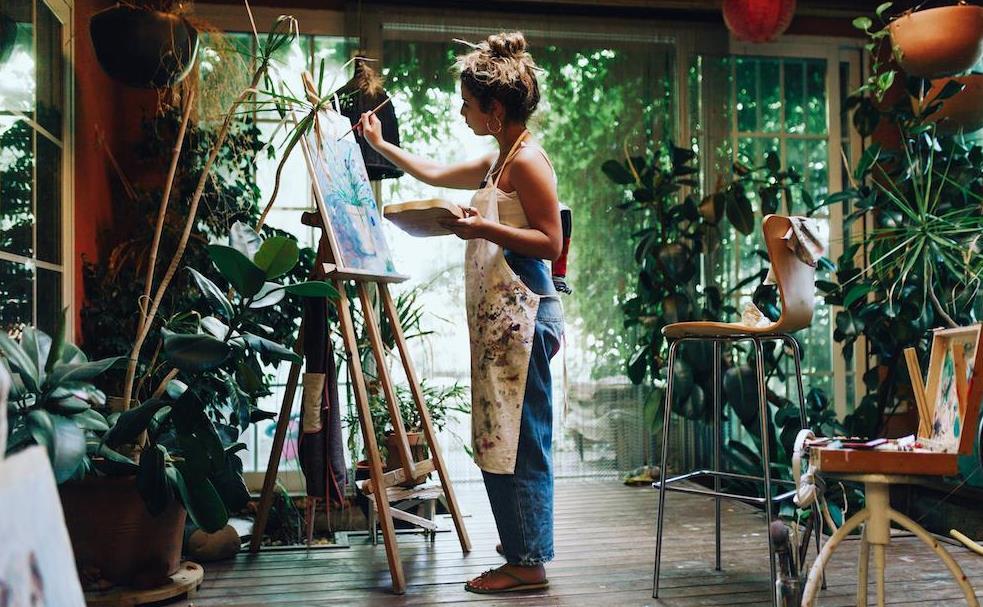Because of the effects of COVID-19 an increasing number of artists, arts practitioners and businesses have had to figure out ways of adapting their business online. For some, teaching online and streaming shows is already part of their practice, while for others it’s a new challenge that requires skills, resources time and money.
In our fifth reader poll we asked readers: What is the biggest single obstacle to taking your arts practice or program online?
The majority of respondents said finding a way to compete with other arts-related content would be a challenge, while the second most popular response asked for more training in order to achieve the skills and knowledge to take their business online.
Finding ways to promote in A busy online space
Cut through and saturation within the online art space was one of the biggest problems readers drew our attention to, in addition to competition with other arts oranisations. Reader Ella wrote: ‘The digital space is being flooded with new arts content –
much of it excellent –
on top of the existing content which was always designed to be presented online. What is to be gained from presenting more?’
Being able to cut-through this space was a concern among readers, another writing: ‘There is just so much going on in the online space and getting cut through on a press release or even a response from someone in media is really hard right now.’
Read: 18 ways to create cut through content
One reader set up a Patreon account but has found social media algorithms weren’t allowing posts advertising the account to be displayed.
‘It means I have to share more of my content for free while trying to direct people to a platform where they can actually chose to support me with a subscription payment (that is quite small, but would help so much),’ she writes. Adding that now is a time to attract new content, even if the market is saturated.
‘I didn’t start the Patreon page earlier because I think the internet is saturated in content (for dance and yoga, but I’m including it with my creative content in the form of dance films and documentation of performances) but while everyone is online at the moment, I’m trying it out!
I need training or knowledge sharing
For other respondents who would like to take their content online, acquiring new skills or knowledge is a barrier stopping them.
One reader wrote that their practice relies on being enjoyed ‘live’. ‘In order to adapt I need to reflect deeply, train in new skills, connect with new collaborators and make sure my practice it is coming from a place of integrity and depth. I don’t want to put a static record up,’ they said.
Megan, a self-taught artist said she finds the learning curve overwhelming when thinking about adapting her arts practice.
‘To adapt your arts practice online you need skills for SEO and uploading images and stories for online galleries as well as marketing, promotion and follow up strategies for social media sites like Instagram. I understand that an artist has to be all of the above though I find it, exciting AND very challenging!’

Don’t have access to equipment/difficult technology
Whether you’re a musician, photographer or painter, the lockdown has made accessibility difficult. Having cash to buy the expensive tools you’d ordinarily access outside your house has been problematic for some readers.
Turning your living room into a studio is not always feasible. ‘In order to display my work online I need to be able to take quality photos. While I have a fairly good camera, my living space is not conducive to creating well-lit photos of my work. I feel that if I post poor quality photos my work will suffer for it,’ wrote one reader.
Others had similar problems in relation to gear.
‘Not Having not good quality camera mics and lights to make professional work but also accessible (close captioning) software and internet that doesn’t take 10hours to upload a 15min video.’
While accessibility provided a challenge for some people, the actual technology itself was a problem for others with internet speeds causing their connection to drop out or waiting for work to upload.
‘I have diminishing IT skills and in my regional town only have my mobile ‘s wifi data and it is not consistent with daily issues,’ wrote one reader.I’ earn less than $5000 a year and have zero funds to invest in producing my work. I also cannot accept asking other creatives to work for me for free. You can do that if all of you are in your 20s but not in your 50s. It’s a tragedy that there is little respect for older creatives with runs on the board..unless you are “famous” younger gatekeepers are outright ageist.’
One of our readers who works within dance and choreography and disability outreach wrote about the challenges of putting classes online. ‘In some instances the migration to an online space is far from perfect, but does what it needs to given the times we’re in. In several other instances, it fails miserably and we are a tech-savvy company! It just adds more work we have zero time for.
‘For example, it took a third of our 90 min class to try and sort out all students’ (most with intellectual disability) tech hitches. When glitches happen (falling out, long term screen freezes) we can lose several people. Given I live with autism/ADHD myself, this can cause me anxiety and stress where I have to finish the session.’
Our 5th reader poll was run online 1-5 May through the ArtsHub Australia website





